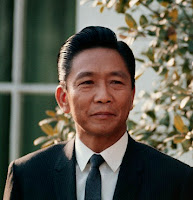Winds of protectionism
 [I wrote this article in June of 2009 as the world reeled from the aftershocks of the 2007 to 2008 global financial meltdown. It remains relevant today as we evaluate development paths we need to take as a nation in a world that is undergoing fundamental change in economic order. It is relevant because Filipinos continue to foolishly look to foreign capital and import-driven consumption as a source of its economic salvation.]
[I wrote this article in June of 2009 as the world reeled from the aftershocks of the 2007 to 2008 global financial meltdown. It remains relevant today as we evaluate development paths we need to take as a nation in a world that is undergoing fundamental change in economic order. It is relevant because Filipinos continue to foolishly look to foreign capital and import-driven consumption as a source of its economic salvation.]Oh the wonders of centrally-controlled economies! China has upped the ante in the on-going global battle against the financial crisis by requiring projects and construction work financed by its $600 billion stimulus fund to buy local materials, unless the required goods cannot be sourced locally. This, of course, has been a cause for worry and even outrage in countries with economies dependent on the Chinese market, with U.S., Australian, and European diplomats issuing appeals and challenges to the rulings. Since the 1st of June [2009], government projects are already required to seek approval before closing any purchase orders for foreign goods.
Considering these protests and invocations of the spirit of "free trade" amongst China's major trading partners, it is interesting to note that the U.S. itself has issued its own "Buy American" provisions in relation to its own stimulus spending while in Australia, the New South Wales state government now provides attractive discounts for local firms bidding for government contracts.
Interesting times have a funny habit of bringing little inconsistencies in the philosophical and ideological fabric of some of the most well-pitched belief systems. In Australia, a big factory closed shop resulting in the loss of hundreds of jobs. This was done by its owner -- a major garments firm -- as part of a move to outsource its manufacturing operations overseas. This led to a media frenzy that stirred up populist sentiment against the company. The response of a representative from the firm was quite simple:
Australians no longer find value in paying a premium for Australian-made goods.
To put the above statement in its proper context, it is important to note that the Australian consumer market is a bit different from that of the Philippines. Australian-made goods are generally of better quality but cost more than products imported from, say, China. Add to this the fact that nowadays, the label "Made in Australia" has become a rare sight on durable and semi-durable goods like plastic products, electronics, and clothing.
Yet Australia is a relatively self-sufficient economy. It grows more than enough food for its population and has a surplus of minerals and fuel deposits, not to mention the technological know-how to exploit these resources.
Australia can, given enough motivation and wherewithal to sacrifice a bit of its standard of living, opt-out from the global economy to a significant degree if it really wanted to.
China, though aware of how dependent its economy is on global demand for its cheap trinkets, for its part seems to be daring enough to dabble in protectionist policies even at the risk of retaliation from its trading partners. It also possesses the smarts, resources, and technology to overcome many challenges associated with being deprived of some of its foreign trade links. In one demonstration of its potential capacity for technological self-sufficiency, Beijing had excluded foreign suppliers of wind turbines -- even those with factories in China -- from bidding in its stimulus-funded power projects.
For Australians, it may be about a concious effort to consume less, specifically forego non-essential things people are led to believe come cheap -- for starters that Made-in-China Wall-E figurine that comes free with a Happy Meal, that Made-in-China blouse that costs one-fourth of a locally made one but also lasts one fourth of the time, those Made-in-China plastic sporks that you use once then throw away. The production of each one of these trinkets depletes the planet's resources unnecessarily and given the ridiculous volumes at which they are produced, well, you know where all this is surely headed.
For the Chinese it may be more about recognising its own domestic market for goods and services, certainly not a quick and dirty way of growing an economy at the 9% clip it's grown accustomed to, but potentially more sustainable and secure nonetheless given the high savings rate of the average Chinese household.
Protectionism. That taboo word of the last two decades is suddenly back in style. Stylish and a real option for those societies that possess an inherent capability to be self-sufficient in the same way that a person who knows how to farm, hunt, and make his own stuff need not rely on a supermarket and a job to live.
Now take the Philippines. It relies on imported food to feed its people and imported capital to sustain whatever industries that remain muddling along in its stagnant economy. It even applies a foreign idea to govern itself. Furthermore it relies on the altruism of the United States, Japan, and other rich countries to provide markets for its quaint highly-commoditised export products as well as employment opportunities for an immense surplus of people it is utterly incapable of employing domestically.
Even in prosperous times of robust global trade volumes, the Philippines was a consistent laggard -- ten to twenty years behind in development in a region of high-achievers. We exported warm bodies instead of keeping them happy and healthy on-shore and smartening them up to produce valuable stuff domestically. We also have one of the lowest savings rates in the region.
So we can imagine what troubles await us as entire economies close their doors to non-essential trade. We don't possess the kind of economic security to prioritise our specific interests simply because we have allowed ourselves to become imprisoned by our dependence on foreign stuff and foreign sources of income.
Indeed, consider then that what the crisis really highlights that is relevant to all is the need to get back to basics:
- Self-sufficiency -- being able to produce domestically what is consumed locally in order to;
- Reduce unhealthy and un-secure dependency on global trade and reliance on unnecessary shipping of goods.
- Simplification of the concept of economic value tying it squarely back to production and tangible assets all sustainably created through;
- Domestic capital creation -- an ability to rely on one's own inherent cleverness to create physical, intellectual, cultural, and (ultimately) financial capital indigenously.
The Philippine economy needs to get back to basics, to stop being a dumping ground for cheap Chinese trinkets, and to re-learn the basic arts of feeding and employing itself.
========
Step back and think of what really underpins our sorry addiction to "globalisation": the rich world's demand for getting things better, faster, and cheaper. An incomplete model of economics wielded by "expert" "economists" convinced several generations that it was economically viable to meet such a bratty demand for stuff. We are finding out now that this model is incomplete because it excluded environmental costs from its equations. Under more holistic economic models now being developed as the reality of environmental degradation becomes more palpable, shipping container loads of useless knickknacks halfway around the world begins to progressively make less sense.
The world economy undoubtedly will recover. But it is possible that the rich world's appetite for excess may not, choosing instead to adopt a more pragmatic economic order that takes the environment into account.
Is the Philippines prepared to compete in such a world, where there is less demand for the kind of useless manufactured goods Third World countries export?
[This article was originally published by the author on 19 June 2009 in the now-defunct FilipinoVoices.com.]




Not that I would want you to get big between the ears or anything, but I'd put this among the best blogs ever penned in the universe. Our penchant for consuming is built up by wanting to out-do the neighbors on the impressiveness scale. What a waste. We should live well but simple, and seek to create jobs that better our relationship with the planet, not eat it alive.
ReplyDeleteThank you sir. Your comment alone made the effort of rescuing it from the abyss that FilipinoVoices.com had dragged it down into worth it. :-)
ReplyDeleteUnfortunately the Goliath that this sort of thing is going up against is a big one. No government or politician in their right mind would get behind the cornerstone idea of the above article which involves putting the brakes on "economic growth" and even perhaps scaling down on standards of living.
A scaling down of standards of living sounds scary because it raises images of downscaling back to subsistence living. But it can be as simple as foregoing small things like hanging out the wash to dry instead of using a drier, taking more domestic and less foreign vacations, eating less meat and more vegetables, buying pricier but more durable stuff, etc. Even here in Sydney where it doesn't get that cold in winter, I am astounded by the number of households that use centralised heating.
The irony is in how some blokes pride themselves in being such tough guys, signing up for triathlons, toning their muscles at the gym, and drinking beer but can't seem to be able to sleep through a single night without unnecessary heating or airconditioning in a city with a climate that is the envy of most of the rest of the world.